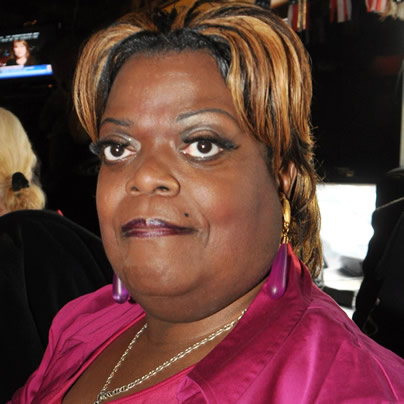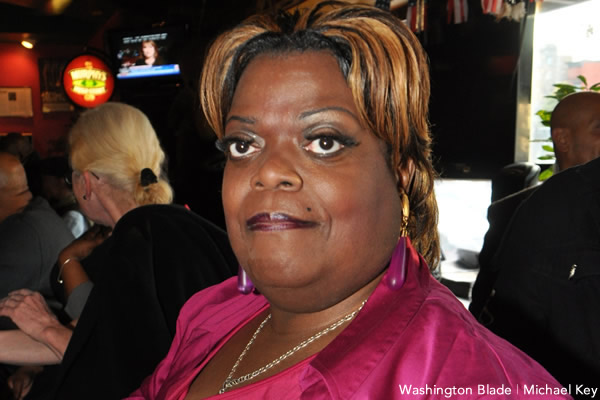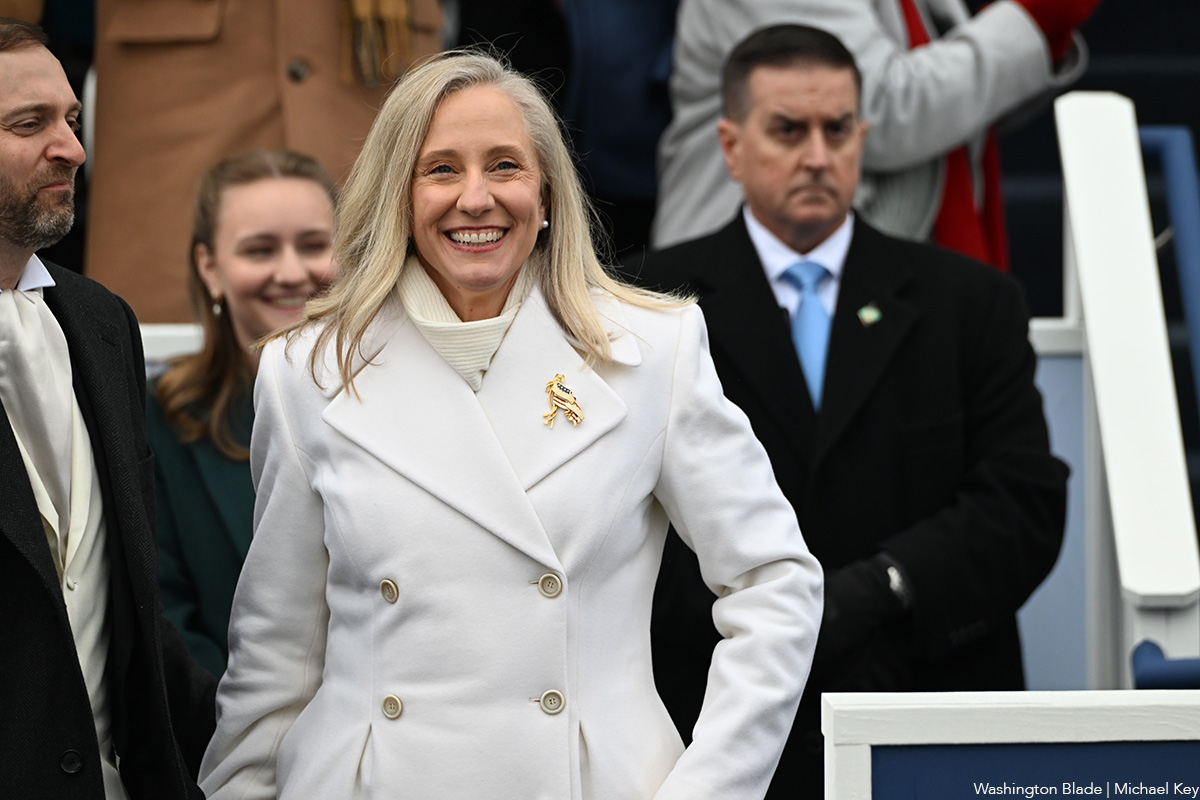Local
2 more trans women attacked in violent month in D.C.
D.C. activists map strategy to curtail anti-LGBT assaults


Transgender activist Earline Budd, who organized a Friday meeting to respond to anti-trans violence, said the slaying of a local lesbian stunned those in the LGBT community who knew her. (Blade file photo by Michael Key)
One transgender woman was shot and another was sexually assaulted in separate incidents in D.C. early Saturday morning, June 29.
The two attacks came less than 24 hours after about 50 LGBT activists met to discuss ways to respond to a rash of violent incidents against LGBT people in the city since June 21, including the June 22 murder of a lesbian who was shot to death in what police said was a botched robbery.
Police said the shooting death of Malika Stover, 35, in the 1300 block of Stevens Road, S.E. didn’t appear to be linked to her sexual orientation.
But transgender activist Earline Budd, who organized the Friday night, June 28 “community response” meeting to address the recent incidents, said Stover’s slaying stunned those in the LGBT community who knew her.
“This is really putting all of us on edge,” Budd told the Blade. “You’re seeing all of these incidents happening in such a short period of time.”
The non-fatal shooting and the unrelated sexual assault of the two transgender women on Saturday, June 29, were the fifth and sixth violent assaults against a total of four transgender women, one gay man dressed in drag, and a lesbian, Stover, since June 21.
In the June 21 incident, transgender woman Bree Wallace, 29, was stabbed multiple times in an abandoned house at 3038 Stanton Rd., S.E.
D.C. police have since arrested 23-year-old Michael McBride of Southeast D.C. for the attack, charging him with assault with intent to kill. Police told the Washington Post the stabbing was triggered by a dispute between Wallace and McBride, who knew each other.
“It’s been a series of horrible incidents in the past few weeks in terms of what’s going on against the transgender community,” said Hassan Naveed, co-chair of Gays and Lesbians Opposing Violence (GLOV).
“And tonight we really built momentum to combat the hate violence in this city,” he said, in commenting on the June 28 meeting at the LGBT Center. “We can see the energy in the community and people really coming together to discuss these issues and acting on this,” said Naveed.
Among those attending the meeting was D.C. Police Capt. Edward Delgado, director of the police division that oversees the department’s Gay and Lesbian Liaison Unit, and two GLLU officers. D.C. Council member Tommy Wells also stopped by the meeting.
“I’m completely open to learning from you,” said Wells, who chairs the Council’s Committee on the Judiciary and Public Safety. “We make progress and then sometimes we take two steps back,” he said in referring to efforts to curtail violence against the LGBT community.
One of the more tense moments of the meeting came when Earl Hooks, a public relations representative for Manny & Olga’s pizzeria chain, answered questions about a 2 a.m. incident on June 23 in which a gay man in drag was attacked at the Manny & Olga’s at 1841 14th St., N.W.
The incident, which was captured on a video that went viral online, involved two women who could be seen on the video dragging Miles Denaro, 24, across the floor by his hair as they punched and kicked him in the head and body. Denaro said he went to the pizzeria to take out some food after performing in drag under his stage name Heidi Glum at the nearby Black Cat nightclub.
An unidentified man taking the video is heard laughing and shouting along with other customers in the Manny & Olga’s restaurant as the two women assaulted Denaro and as blood could be seen dripping over his face from a head wound. According to Denaro, as many as five or six employees stood by watching and didn’t take steps to break up the altercation or call police. He said the two women who assaulted him called him “tranny” and “faggot.”
“I’m here right now to apologize for anything that is harmful to this community,” Hooks told the meeting.
Gay activist Nick McCoy, who helped organize the meeting, said he contacted Manny & Olga’s and invited the owners to send someone to the meeting to talk about the incident.
Several activists, including D.C. Center Executive Director David Mariner, pressed Hooks to explain why the employees apparently failed to take steps to stop the attack.
“Our policy is to not touch anyone who comes into the store,” he said. “From what I understand, a call was made to the police.”
Police sources, however, have said no call was received from Manny & Olga’s at the time of the incident.
Delgado told the Blade at the meeting that police have obtained warrants for the arrest of the two women on a charge of simple assault. He said the women had not been apprehended as of the time of the meeting.
Denaro told the Blade he wasn’t seriously injured.
In addition to Budd, speakers at the meeting included Naveed of GLOV; Rick Rosendall, president of the Gay and Lesbian Activists Alliance; Nico Quintana of the D.C. Trans Coalition; Ruby Corado of Casa Ruby; Sterling Washington, director of the Mayor’s Office of GLBT Affairs; and Cyndee Clay, executive director of Helping Individual Prostitutes Survive (HIPS).
Officer Juanita Foreman of the GLLU gave a presentation on steps citizens can take, including members of the LGBT community, to avoid danger while walking on the streets.
Mariner said the D.C. Center would make available to the community a compilation of proposals developed at the meeting to address anti-LGBT violence in the city.
The following summary of the six incidents involving attacks against members of the LGBT community between June 21 and June 29 is based on information released by D.C. police. As of early this week police had not classified any of the incidents as a hate crime, although a source familiar with police thought the incident at Manny & Olga’s would be listed as a hate crime:
1. Transgender woman Bree Wallace, 29, was attacked and stabbed multiple times in an abandoned house at 3038 Stanton Rd., S.E. about 1 a.m. Thursday, June 21. A suspect was arrested and charged with assault with intent to kill.
2. Malika Stover, 35, identified by Earline Budd as an out lesbian known in the LGBT community, was fatally shot about 2 a.m. Saturday, June 22, in the 1300 block of Stevens Road, S.E. Police say she suffered from multiple gunshot wounds and the motive appeared to be robbery.
3. Gay male drag performer Miles Denaro, 24, was attacked and beaten by two female suspects about 2 a.m. Sunday, June 23, inside Manny & Olga’s pizzeria at 1841 14th St., N.W.
4. A transgender woman was shot in the buttocks in the 500 block of Eastern Avenue, N.E., about 6 a.m. Thursday, June 27. Police say the motive appears to be robbery.
5. A transgender woman was sexually assaulted by an unidentified male after accepting a ride in the suspect’s car while walking in the 300 block of 61st Street, N.E. about 3:30 a.m. Saturday, June 29. Police listed the incident as a first-degree sexual assault.
6. A transgender woman was shot and sustained non-life-threatening injuries while walking in the area of 5th and K Street, N.E., about 4 a.m. Saturday, June 29. Police said the shooting took place while two male suspects attempted to rob her.
Virginia
Va. activists preparing campaign in support of repealing marriage amendment
Referendum about ‘dignity and equal protection under the law’

Virginia voters in November will vote on whether to repeal their state’s constitutional amendment that defines marriage as between a man and a woman.
Democratic Gov. Abigail Spanberger on Feb. 6 signed House Bill 612 into law. It facilitates a referendum for voters to approve the repeal of the 2006 Marshall-Newman Amendment. Although the U.S. Supreme Court’s Obergefell ruling extended marriage rights to same-sex couples across the country in 2014, codifying marriage equality in Virginia’s constitution would protect it in the state in case the decision is overturned.
Maryland voters in 2012 approved Question 6, which upheld the state’s marriage equality law, by a 52-48 percent margin. Same-sex marriage became legal in Maryland on Jan. 1, 2013.
LGBTQ advocacy groups and organizations that oppose marriage equality mounted political campaigns ahead of the referendum.

Equality Virginia has been involved in advancing LGBTQ rights in Virginia since 1989.
Equality Virginia is working under its 501c3 designation in conjunction with Equality Virginia Advocates, which operates under a 501c4 designation, to plan campaigns in support of repealing the Marshall-Newman Amendment.
The two main campaigns on which Equality Virginia will be focused are education and voter mobilization. Reed Williams, the group’s director of digital engagement and narrative, spoke with the Washington Blade about Equality Virginia’s plans ahead of the referendum.
Williams said an organization for a “statewide public education campaign” is currently underway. Williams told the Blade its goal will be “to ensure voters understand what this amendment does and why updating Virginia’s constitution matters for families across the commonwealth.”
The organization is also working on a “robust media and voter mobilization campaign to identify and turn out voters” to repeal Marshall-Newman Amendment. Equality Virginia plans to work with the community members to guarantee voters are getting clear and accurate information regarding the meaning of this vote and its effect on the Virginia LGBTQ community.
“We believe Virginia voters are ready to bring our constitution in line with both the law and the values of fairness and freedom that define our commonwealth,” said Equality Virginia Executive Director Narissa Rahaman. “This referendum is about ensuring loving, committed couples and their families are treated with dignity and equal protection under the law.”
The Human Rights Campaign has also worked closely with Equality Virginia.
“It’s time to get rid of outdated, unconstitutional language and ensure that same sex couples are protected in Virginia,” HRC President Kelley Robinson told the Blade in a statement.
District of Columbia
D.C. police arrest man for burglary at gay bar Spark Social House
Suspect ID’d from images captured by Spark Social House security cameras

D.C. police on Feb. 18 arrested a 63-year-old man “of no fixed address” for allegedly stealing cash from the registers at the gay bar Spark Social House after unlawfully entering the bar at 2009 14th St., N.W., around 12:04 a.m. after it had closed for business, according to a police incident report.
“Later that day officers canvassing for the suspect located him nearby,” a separate police statement says. “63-year-old Tony Jones of no fixed address was arrested and charged with Burglary II,” the statement says.
The police incident report states that the bar’s owner, Nick Tsusaki, told police investigators that the bar’s security cameras captured the image of a man who has frequently visited the bar and was believed to be homeless.
“Once inside, the defendant was observed via the establishment’s security cameras opening the cash register, removing U.S. currency, and placing the currency into the left front pocket of his jacket,” the report says.
Tsusaki told the Washington Blade that he and Spark’s employees have allowed Jones to enter the bar many times since it opened last year to use the bathroom in a gesture of compassion knowing he was homeless. Tsusaki said he is not aware of Jones ever having purchased anything during his visits.
According to Tsusaki, Spark closed for business at around 10:30 p.m. on the night of the incident at which time an employee did not properly lock the front entrance door. He said no employees or customers were present when the security cameras show Jones entering Spark through the front door around 12:04 a.m.
Tsusaki said the security camera images show Jones had been inside Spark for about three hours on the night of the burglary and show him taking cash out of two cash registers. He took a total of $300, Tsusaki said.
When Tsusaki and Spark employees arrived at the bar later in the day and discovered the cash was missing from the registers they immediately called police, Tsusaki told the Blade. Knowing that Jones often hung out along the 2000 block of 14th Street where Spark is located, Tsusaki said he went outside to look for him and saw him across the street and pointed Jones out to police, who then placed him under arrest.
A police arrest affidavit filed in court states that at the time they arrested him police found the stolen cash inside the pocket of the jacket Jones was wearing. It says after taking him into police custody officers found a powdered substance in a Ziploc bag also in Jones’s possession that tested positive for cocaine, resulting in him being charged with cocaine possession in addition to the burglary charge.
D.C. Superior Court records show a judge ordered Jones held in preventive detention at a Feb. 19 presentment hearing. The judge then scheduled a preliminary hearing for the case on Feb. 20, the outcome of which couldn’t immediately be obtained.
District of Columbia
Judge rescinds order against activist in Capital Pride lawsuit
Darren Pasha accused of stalking organization staff, board members, volunteers

A D.C. Superior Court judge on Feb.18 agreed to rescind his earlier ruling declaring local gay activist Darren Pasha in default for failing to attend a virtual court hearing regarding an anti-stalking lawsuit brought against him by the Capital Pride Alliance, the group that organizes D.C.’s annual Pride events.
The Capital Pride lawsuit, initially filed on Oct. 27, 2025, accuses Pasha of engaging in a year-long “course of conduct” of “harassment, intimidation, threats, manipulation, and coercive behavior” targeting Capital Pride staff, board members, and volunteers.
In his own court filings without retaining an attorney, Pasha has strongly denied the stalking related allegations against him, saying “no credible or admissible evidence has been provided” to show he engaged in any wrongdoing.
Judge Robert D. Okum nevertheless on Feb. 6 approved a temporary stay-away order requiring Pasha to stay at least 100 feet away from Capital Pride’s staff, volunteers, and board members until the time of a follow-up court hearing scheduled for April 17. He reduced the stay-away distance from 200 yards as requested by Capital Pride.
In his two-page order issued on Feb. 18, Okun stated that Pasha explained that he was involved in a scooter accident in which he was injured and his phone was damaged, preventing him from joining the Feb. 6 court hearing.
“Therefore, the court finds there is a good cause for vacating the default,” Okun states in his order.
At the time he initially approved the default order at the Feb. 6 hearing that Pasha didn’t attend, Okun scheduled an April 17 ex parte proof hearing in which Capital Pride could have requested a ruling in its favor seeking a permanent anti-stalking order against Pasha.
In his Feb. 18 ruling rescinding the default order Okun changed the April 17 ex parte proof hearing to an initial scheduling conference hearing in which a decision on the outcome of the case is not likely to happen.
In addition, he agreed to consider Pasha’s call for a jury trial and gave Capital Pride 14 days to contest that request. The Capital Pride lawsuit initially called for a non-jury trial by judge.
One request by Pasha that Okum denied was a call for him to order Capital Pride to stop its staff or volunteers from posting information about the lawsuit on social media. Pasha has said the D.C.-based online blog called DC Homos, which Pasha claims is operated by someone associated with Capital Pride, has been posting articles portraying him in a negative light and subjecting him to highly negative publicity.
“The defendant has not set forth a sufficient basis for the court to restrict the plaintiff’s social media postings, and the court therefore will deny the defendant’s request in his social media praecipe,” Okun states in his order.
A praecipe is a formal written document requesting action by a court.
Pasha called the order a positive development in his favor. He said he plans to file another motion with more information about what he calls the unfair and defamatory reports about him related to the lawsuit by DC Homos, with a call for the judge to reverse his decision not to order Capital Pride to stop social media postings about the lawsuit.
Pasha points to a video interview on the LGBTQ Team Rayceen broadcast, a link to which he sent to the Washington Blade, in which DC Homos operator Jose Romero acknowledged his association with Capital Pride Alliance.
Capital Pride Executive Director Ryan Bos didn’t immediately respond to a message from the Blade asking whether Romero was a volunteer or employee with Capital Pride.
Pasha also said he believes the latest order has the effect of rescinding the temporary stay away order against him approved by Okun in his earlier ruling, even though Okun makes no mention of the stay away order in his latest ruling. Capital Pride attorney Nick Harrison told the Blade the stay away order “remains in full force and effect.”
Harrison said Capital Pride has no further comment on the lawsuit.



















